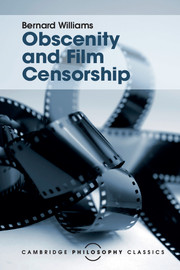5 - Law, morality and the freedom of expression
from Part 2 - Principles
Published online by Cambridge University Press: 05 November 2015
Summary
5.1 What sorts of conduct may the law properly seek to suppress? An answer to that question which is widely accepted in our society, as in many other modern societies, is that no conduct should be suppressed by law unless it can be shown to harm someone. It is one sign of how many people now accept this answer and the condition which it imposes on legislation—it may be called the harm condition—that almost without exception the evidence we received, insofar as it touched on these matters of principle, stated something like this condition or took it for granted. Submissions to us differed, very obviously, about what harms, if any, publications and films might cause. They differed also about what might count as a harm. Those who favoured the abolition or limitation of legal restraint tended, not surprisingly, to define “harm” in a narrower and more determinate way, while those who supported greater legal control admitted more generalised and less identifiable harms. Virtually everyone, however, whatever their suggestions, used the language of “harm” and accepted, so it seemed, the harm condition.
5.2 We accept the harm condition. As the variety of views in the submissions to us shows, however, that leaves many basic questions still to be answered.
Law and morality
5.3 The harm condition has been very much discussed in recent years in the context of debates on the question whether prevailing morality should be made into law: that is to say, whether the fact that many people in society think something morally wrong is a good enough reason for there being a law against it. If the harm condition for legislation is accepted, then the answer to this question will be “no”, since there are acts which are morally disapproved but are not harmful, and it will follow from the harm condition that there should be no law against these.
- Type
- Chapter
- Information
- Obscenity and Film CensorshipAn Abridgement of the Williams Report, pp. 69 - 82Publisher: Cambridge University PressPrint publication year: 2015

